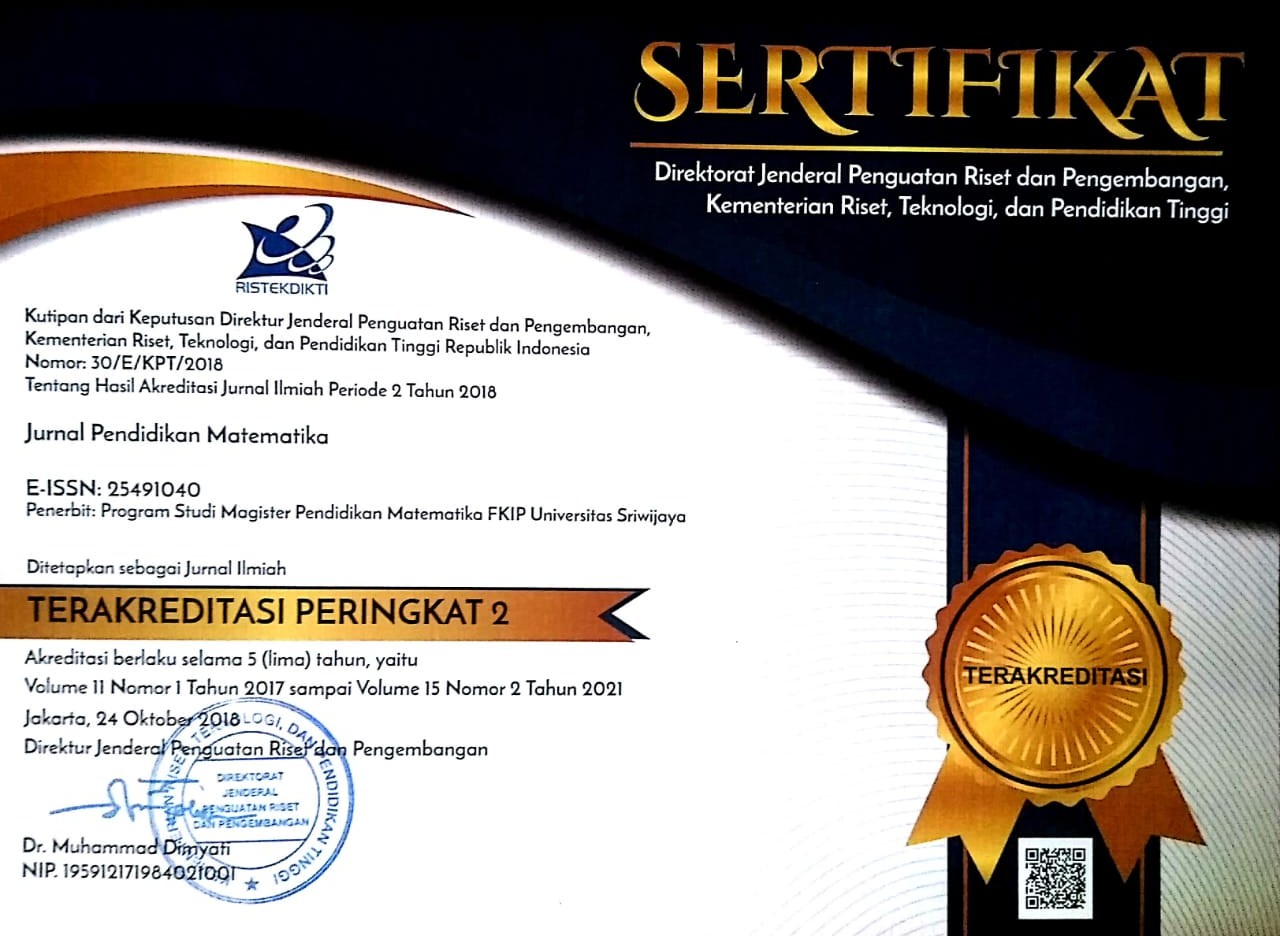STUDENTS’ STATISTICAL REASONING IN STATISTICS METHOD COURSE
Abstract
The role of statistics is wide and crucial in daily life, making statistics important. Many students have difficulty understanding statistics. This study aims to determine students' statistical reasoning about inference statistics, which is limited to the subject matter of the testing hypotheses about two-sample hypotheses testing. This study used descriptive research method. The subjects were 25 students of third-year Mathematics Education Departement at Universitas PGRI Palembang in the academic year 2018/2019. Data were collected through tests and interviews. Data were analyzed through descriptive quantitative. The results of data analysis showed that 32% of students had level 1 statistical reasoning (the lowest level), 20% were at level 2, 28% at level 3, 12% at level 4 and 8% at level 5 (highest level). Based on the result, it can conclude that students' statistical reasoning ability in learning statistical method is not satisfactory, students are still very lacking in reasoning.
Keywords
Full Text:
PDFReferences
Diniyah, A.N., Akbar, G.A., Akbar, P., Nurjaman, A., & Bernard, M. (2018). Analysis of senior high school students' reasoning ability and self confidence in probability [in Bahasa]. Journal on Education, 1(1), 14-21.
Canadas, G.R., Batanero, C., Diaz, C., & Roa, R. (2012). Psychology students’ understanding of the chi-squared test. Statistique et Enseignement, 3(1), 3-18.
Chan, S.W., & Ismail, Z. (2012). The role of information technology in developing students' statistical reasoning. Procedia-Social and Behavioral Science, 46, 3660-3664. https://doi.org/10.1016/j.sbspro.2012.06.123.
Chan, S.W., & Ismail, Z. (2013). Developing statistical reasoning assessment instrument for high school students in descriptive statistics. Procedia-Social and Behavioral Sciences, 116, 4338-4343. https://doi.org/10.1016/j.sbspro.2014.01.943.
Chan, S.W., Ismail, Z., & Sumintono, B. (2016). A framework for assessing high school students' statistical reasoning. PLoS ONE, 11(11), 1-32. https://doi.org/10.1371/journal.pone.0163846.
Coladarci, T., Cobb, C.D., Minium, E.W., & Clarke, R.B. (2011). Fundamentals of Statistical Reasoning in Education. USA: John Wiley & Son, Inc.
Dolor, J., & Noll, J. (2015). Using guided reinvention to develop teachers’ understanding of hypotheses testing concepts. Statistics Education Research Journal, 14(1), 60-89.
Garfield, J. B. (2002). The challenge of developing statistical reasoning. Journal of Statistics Education, 10(3). https://doi.org/10.1080/10691898.2002.11910676.
Garfield, J. B., & Ben-Zvi, D. (2008). Developing Students' Statistical Reasoning. USA: Springer.
Hasanah, S.I., Tafrilyanto, C.F., & Aini, Y. (2018). Mathematical reasoning: The characteristics of students’ mathematical abilities in problem solving. Journal of Physics: Conference Series, 1188, 1-8. https://doi.org/10.1088/1742-6596/1188/1/012057.
Krishnan, S., & Idris, N. (2014). Students’ misconceptions about hypothesis test. Journal of Research in Mathematics Education, 3(3), 276-293. https://doi.org/10.17583/redimat.2014.1140.
Krishnan, S., & Idris, N. (2015). An overview of students’ learning problems in hypothesis testing. Jurnal Pendidikan Malaysia, 40(2), 193-196. https://doi.org/10.17576/JPEN-2015-4002-12.
Lanani, K. (2014). Developing of ICT project-based teaching material and research instrument to enchance the students' statistical reasoning-ability, statistical communication and academic help-seeking [in Bahasa]. Delta-pi: Jurnal Matematika dan Pendidikan Matematika, 3(2), 1-12.
Nisa, S., Zulkardi, & Susanti, E. (2019). Students' statistical reasoning ability on histrogram data presentation materials through PMRI learning [in Bahasa]. Jurnal Pendidikan Matematika, 13(1), 21-40. https://doi.org/10.22342/jpm.13.1.5460.21-40.
Rahmawati, R., Mardiyana, & Triyanto. (2018). Analysis of students’ mathematical reasoning ability in solving mathematics problem. Proc. The International Conference on Teacher Training Educaton (ICTTE) 2018, 262, 311-314. https://dx.doi.org/10.2991/ictte-18.2018.57.
Reaburn, R. (2011). Students' Understanding of Statistical Inference: Implications for Teaching. Dissertation. Australia: University of Tasmania.
Régniera, J.-C., & Kuznetsova, E. (2014). Teaching of statistics: Formation of statistical reasoning. Procedia-Social and Behavioral Sciences, 154, 99-103. https://doi.org/10.1016/j.sbspro.2014.10.119.
Sotos, A.E.C, Vanhoof, S., Noortgate, W.V., & Onghena, P. (2009). How confident are students in their misconceptions about hypotheses tests?. Journal of Statistics Education, 17(2). https://doi.org/10.1080/10691898.2009.11889514.
Stalveya, H.E., Burns-Childersb, A., Chamberlain, D., Kemp, A., Meadows, L.J., & Vidakovic, D. (2019). Students’ understanding of the concepts involved in one-sample hypothesis testing. The Journal of Mathematical Behavior, 53, 42-64. https://doi.org/10.1016/j.jmathb.2018.03.011.
Whitaker, D., Foti, S., & Jacobbe, T. (2015). The levels of conceptual understanding in statistics (LOCUS) project: Results of the pilot study. Numeracy: Advancing Education in Quantitative Literacy, 8(2), 1-16. http://dx.doi.org/10.5038/1936-4660.8.2.3.
Yusuf, Y. (2017). Construction of statistical reasoning in research statistics [in Bahasa]. Scholaria: Jurnal Pendidikan dan Kebudayaan, 7(1), 60-69. https://doi.org/10.24246/j.scholaria.2017.v7.i1.p60-69.
DOI: https://doi.org/10.22342/jpm.14.1.6732.81-90
Jl. Srijaya Negara, Bukit Besar
Palembang - 30139 Indonesia
Jurnal Pendidikan Matematika is licensed under a Creative Commons Attribution-NonCommercial-ShareAlike 4.0 International License.
Indexed in:


